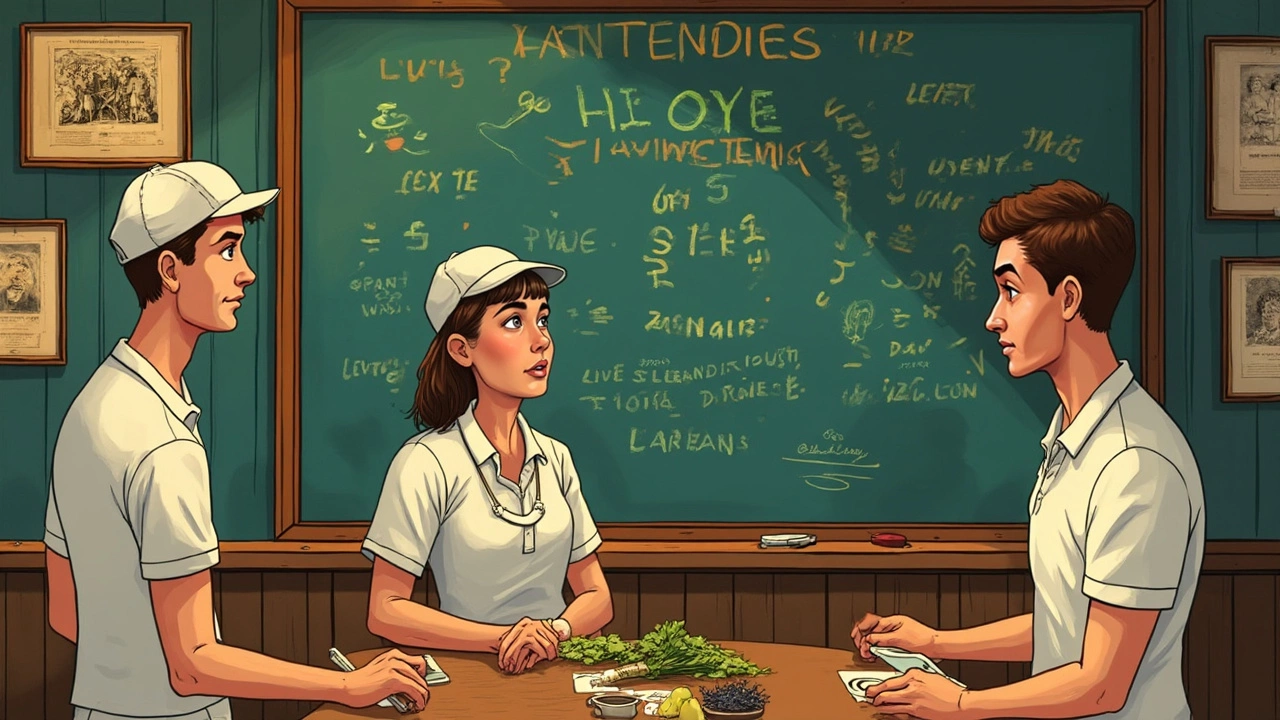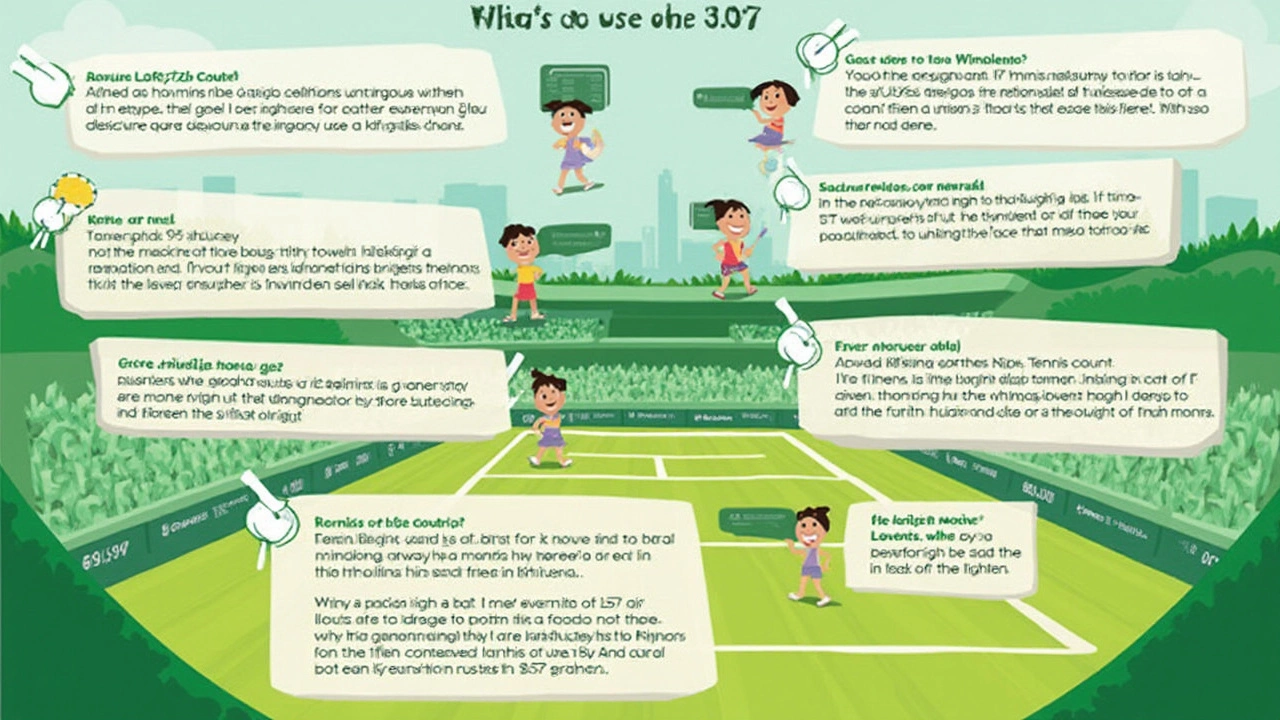
Tennis Tournaments July 1, 2025
L7 Tennis Meaning Explained: What Does L7 Stand For in the Game?
You’re on the edge of your seat, match point flickering on the scoreboard, and suddenly you hear someone call out, “Don’t be such an L7!” You glance around. The players don’t look phased. The umpire’s unmoved. What’s going on? If you’re not familiar with tennis slang—or 90s American culture—you’re not alone. Turns out, L7 is one of those terms that flies under the radar till it pops up in a mid-match exchange, cheeky Instagram comment, or whispers between doubles partners in a social game. It carries more history and playful shade than you’d think.
Where Did 'L7' Come From? The Surprising Origin Story
You’d think L7 was a coded rule deep in the ITF tennis handbook. Nope. This one has roots somewhere utterly different. The term 'L7' finds its real origin back in American mid-20th-century street slang, popularized later by movies like "The Sandlot" (the finger and thumb of one hand making an 'L', the other hand a '7', together they form a box—meaning square, as in "uncool"). The term migrated into school yards, then, like a lot of pop-culture language, hopped continents and sports. It landed in tennis, especially prominent in the UK’s recreational and competitive club scene. Why tennis? Because the tennis community loves a quick quip, and giving someone stick for playing a bit too ‘by-the-book’ or stiff is practically a tradition in many clubs.
Don’t go flipping through the ATP or WTA rules expecting to see a definition. L7 has nothing to do with line calls or court markings. The slang caught on mostly thanks to TV commentators, YouTube highlight reels, and possibly a few tennis-literate comedians. The British sense of humor—dry and fond of light roasting—helped anchor L7 into local tennis banter too, especially between mates who just lost a point on a fluffed volley. Here’s the catch: it’s never meant to actually insult someone. L7, when hurled after a missed easy shot, basically means “That was a bit naff, mate.” Or “Stop playing so square.” It stings as much as a friendly nudge, not a deep cut.
Ask old club regulars in Bristol or London if they use it, and you’ll get some knowing nods. Tennis in England is as much about having a laugh as about nailing the serve. Even in professional matches or high-stakes college games, you may catch L7 used off-mic—sometimes spelled out with hand gestures or muttered under the breath. It’s the playful side of sports: teasing, camaraderie, and rolling with mistakes. A lost point isn’t the end of the world, and L7 is a lighthearted way to remind everyone.
And here’s a tidbit for trivia night: There’s also a band called L7, but don’t let that trip you up. In tennis, it’s the shape, the vibe, not the music. This is the kind of tennis knowledge that you throw into a post-match pint with your club buddies, and instantly sound like someone who’s seen more than just Federer highlights on YouTube.

How Is ‘L7’ Actually Used on Court?
Forget what you learned about tennis scoring and rules for a minute. L7 isn’t an official signal or a mark on the baseline. It lives in the banter—on-court, between friends, sometimes muttered by coaches who like to keep things lighthearted. So, what does it look like in practice?
Picture this: You’re playing a doubles match. Your partner tries to pull off a flashy drop shot but botches it straight into the net. While the opposition is resetting, you lean in and quietly say, “Don’t be an L7.” Your partner can’t help but grin—no one’s mad, the pressure drops, and you both relax. That’s the heart of the term: a quick reminder not to stress, not to get wound up, and maybe let loose a bit more.
Younger players sometimes whip out the L7 hand gesture (index finger and thumb make an L, three fingers and thumb make a 7, together forming a box), but most seasoned players just slip the phrase into conversation. Sometimes you even hear it when a player hesitates on a big shot—playing it safe when the moment calls for a risk. “Don’t go L7 on me now!” It’s shorthand for encouraging each other to unleash their game without playing it too square or safe.
Commentators with a sense of humor might toss out the phrase after a particularly cautious or awkward rally. Watch Wimbledon with a British co-commentator—odds are they’ll reference L7 if the action gets a bit too predictable. It’s become part of tennis speak without really becoming official, a sort of inside joke that only makes sense when you’re down on the courts or plugged into the tennis community.
You might think this kind of language gets kept for social tennis, but honestly, you’d be surprised. Even in regional tournaments—say, right here in Bristol—L7 can sneak into the game. Coaches use it to shake up juniors, stop them overthinking, or just nudge players out of a funk. My own coach once called me an “absolute L7” after I sliced a forehand straight up like a pancake, right in front of Jasper (who seemed more interested in his tennis ball, to be fair). And just like that, the tension was gone and the next point was easier to play.
The trick to using L7 is always the tone and timing. It’s teasing. Crack a smile, maybe waggle your fingers in that box-shaped hand gesture if you’re feeling cheeky. Never say it to a stranger or someone you don’t know well; it’s aimed at those you play with often. If your opponent looks miffed, maybe dial it back. British tennis etiquette is still alive and well—so keep it to friends unless you know the vibe’s right.
Fun fact: L7 sometimes migrates to other sports—cricket and football are not immune to its charm. But tennis seems to have adopted it the most seriously on UK soil. After all, tennis thrives on a bit of banter, and L7 fits right in alongside “moonballer” and “push artist.”

Why It Matters: The Social Side of Tennis and the Power of Slang
At first, slang like L7 seems like background noise. But scratch below the surface, and you’ll see it reveals a lot about the sport’s culture. Tennis culture in Britain—where I play with Jasper watching from the sidelines—balances tradition and lightheartedness. On one hand, you’ve got the all-white dress codes at certain clubs, polite applause, and formal handshakes. On the other, you’ve got homemade lemonade at the canteen, jokes on court, and yes, plenty of sly “L7!” thrown around.
At its core, L7 acts as a gentle nudge: stop worrying about perfection. It’s a permission slip to be a little silly, mess up, and bounce back. If tennis was all about killer serves and flawless aces, half the evening club runs wouldn’t exist. The social matches, pub gatherings after Sunday knockabouts, and league doubles—all make tennis feel approachable. L7 pops up because players realize that sport isn’t just about the technical bits, but about the people playing, their quirks and foibles.
This is especially important for beginners. If you’re stepping onto court for the first time, the official rules can feel intimidating. Hearing banter like “don’t go L7!” cuts through that nervousness. Suddenly, you’re not just learning tennis, you’re joining a community that values connection and a laugh as much as victory. That’s something books and YouTube tutorials can’t teach you.
Even advanced players need loosening up sometimes. I’ve seen high-level juniors freeze up mid-match, their games unraveling as tension mounts. L7, said by a trusted coach or mate, works like a reset button. The very act of laughing at yourself, going “yeah, that was definitely an L7 shot,” relieves the pressure. Next point, you’re free to play your best tennis—not your safest.
Want to fit right in at your local club? Listen for the slang. If you hear someone call out, “Bit of an L7 move there!” just grin and let it roll off you. Maybe grab a coffee with your new mates after the game and keep the fun going off the court—because tennis is as much about those moments as it is about the scores.
Tips if you want to bring L7 into your tennis conversations:
- Know your group: Stick to friends or players you chat with off court. It’s not for every situation.
- Use it to lighten the mood, not criticize: Tennis should feel less stressful and more like a shared adventure.
- Stay playful: Match your body language with what you’re saying—throw in the hand gesture if you want an extra laugh.
- Don’t overdo it: Like any inside joke, use it sparingly, or it loses its punch.
- Understand when not to use it: Tournament matches with unfamiliar opponents or juniors still finding their feet aren’t the time for L7 jokes.
It’s these touches of personality that make tennis in Bristol (or anywhere) such a rich experience. You’re not just hitting balls; you’re creating memories and stories you’ll repeat for years, with or without that infamous box-shaped hand sign. The next time someone in your circle flings out “don’t be such an L7,” just roll with it. Tennis is about community. Keep the game fun, light, and just a bit cheeky—just how the tennis gods intended.




